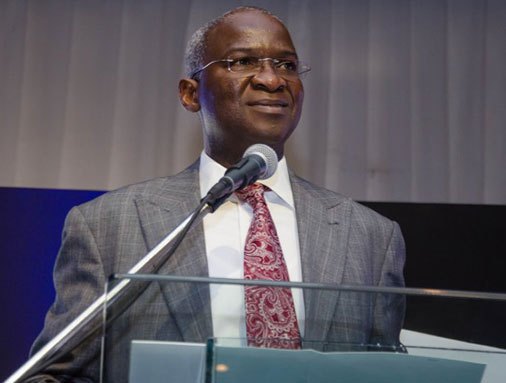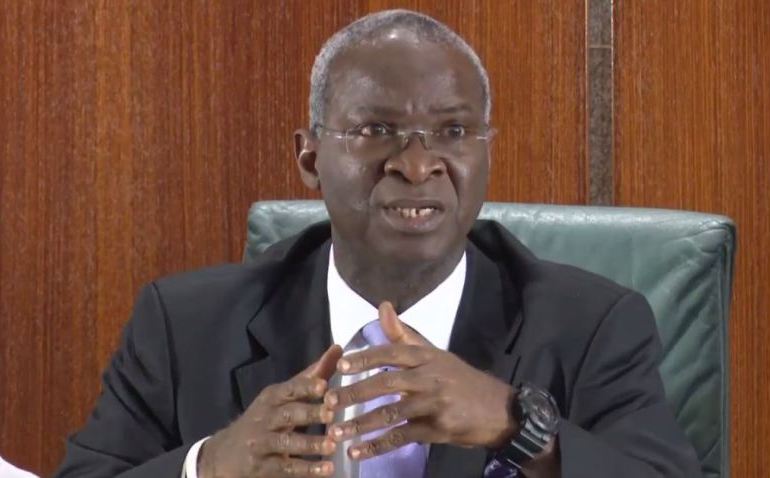Federal Government on Thursday said it had committed N300 billion so far on road infrastructure as against the previous administration, which committed only N18 billon.
Mr Babatunde Fashola, the Minister of Work, Power and Housing said this during the 4th Quadrennial Delegates Conference of Petroleum Tanker Drivers (PTD) with the theme: “Road Infrastructure in Nigeria: Impacts on Petroleum Products Distribution” in Abuja.
“It is one thing to have a plan, it is another thing to commit to the faithful implementation of that plan; let me remind you that the budget I inherited from the ministry of works from the last administration was N18 billion for all the roads in Nigeria.
“Only N9 billion was paid out of the budget but the last budget in the state that I left for road was about N74 billion for one state, while the whole country budgeted N18 billion during the time of transformation agenda.
“That is when the country was earning about 100 dollars for one barrel of oil but this is the time of economic recovery and growth plan which has committed close to N300 billion to road and with funding of about N260 billion.
“And this is happening when oil price is below 100 dollars per barrel, meaning that this administration is doing more with less resources.”
He said that government had identified six priority areas of road that needed urgent attention, noting that it did not mean other areas were totally left out.
The minister noted that there was no state in the country presently that road construction or rehabilitation was not going on, adding that 300 roads across Nigeria were under construction.
He said the six areas of focus were the roads with the heaviest traffic which was the A1-A4 road like Lagos-Shagamu, Ore-Benin, Enugu,Onisha, Calabar, adding that the contractor had gone back to site on the Lagos-Ibadan expressway.
Fashola said that road connecting agricultural development areas roads leading to ports and depot; roads inside higher institutions and comprehensive maintenance of bridges and repairs were being given priorities at the moment.
He, however, added that the biggest causes of road accident based on the monthly report given to the ministry was over speeding with 10 per cent caused by bad road and, charged the tanker drivers to put safety first.
Dr Maikanti Baru, the Group Managing Director, Nigerian National Petroleum Corporation (NNPC), acknowledged the role of tanker drivers in resolving the challenges of distribution of fuel product during fuel scarcity.
He said with the help of the association, they were able to apprehend those involved in fuel diversion and smugglers in the country.
Baru pledged NNPC’s continuous dialogue and collaboration with the association to ensure smooth distribution of fuel product in the country.
Dr Salimon Oladiti, the National Chairman, Petroleum Tanker Drivers branch of NUPENG said the theme was centered around the major concern of its members, which was road infrastructure.
“The theme for this conference centres around the major condition of work for our teeming members, which is road infrastructure and its impact on our efficiency and effective delivery on petroleum products.”
Oladiti however commended its members for their continuous support for the association and their commitment toward the newly commissioned PTD hotels in Utako.

 FAB FRESH7 days ago
FAB FRESH7 days ago
 ENTERTAINMENT7 days ago
ENTERTAINMENT7 days ago
 MUSIC6 days ago
MUSIC6 days ago
 ENTERTAINMENT7 days ago
ENTERTAINMENT7 days ago
 ENTERTAINMENT6 days ago
ENTERTAINMENT6 days ago
 MUSIC5 days ago
MUSIC5 days ago
 LIFESTYLE6 days ago
LIFESTYLE6 days ago
 ENTERTAINMENT5 days ago
ENTERTAINMENT5 days ago






































